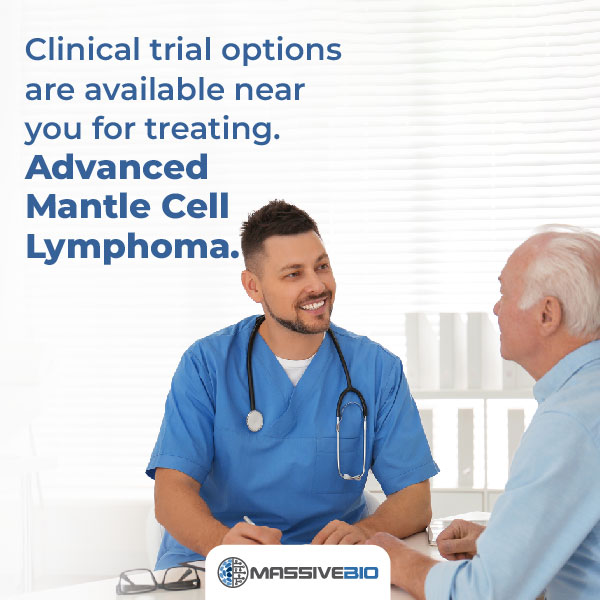News
Massive Bio Has Onboarded Over 120,000 Cancer Patients to Find Their Clinical Trial
New Perspectives: Lymphoma Clinical Trials
Navigating a lymphoma diagnosis, with its varied forms and stages, may seem overwhelming. However, clinical trials could have the key to treatments that target your specific lymphoma, offering the promise of transforming care.
Start Your JourneyCompliant with

You can receive a guidebook with information about lymphoma by filling out the form.
How our system works
We’re here to assist you in finding effective treatments for lymphoma. Utilizing our cutting-edge artificial intelligence (AI) platform, we can suggest personalized clinical trials tailored to your specific situation. Recognizing the significance of addressing lymphoma comprehensively, once you provide your details, our team of oncology experts will evaluate your case and get in touch with you.
We place particular emphasis on difficult situations encountered by lymphoma patients. Some of these include facing rare types of lymphomas like diffuse large B-cell lymphoma and mantle cell lymphoma. Whether it is for patients who are ineligible for traditional initial therapies, like anthracyclines, who are refractory to treatment or who have relapsed, we simplify the process for them to find and participate in clinical trials that give them access to the latest treatment options.


Understanding the disease
What is lymphoma?
Lymphoma is a form of cancer that originates in the lymphatic system, a vital part of the body’s immune system. It involves the abnormal growth of cells in the lymph nodes, spleen, bone marrow, and other lymphoid tissues. If left untreated, these aberrant cells can potentially spread to other areas of the body.
Sometimes, signs of lymphoma can look like swollen lymph nodes, unexplained fevers or unexplained weight loss. However, these symptoms of lymphoma alone are not enough to make a diagnosis. If you are experiencing suspicious symptoms, talk to your healthcare provider.
Lymphomas are broadly categorized into two main types: Hodgkin lymphoma (HL) and non-Hodgkin lymphoma (NHL). Each type is further divided into various subtypes based on specific characteristics, including cell type, growth pattern, and other molecular features.
Hodgkin Lymphoma (HL):
- Classical Hodgkin Lymphoma (cHL): This is the more common type and includes subtypes such as nodular sclerosis, mixed cellularity, lymphocyte-rich, and lymphocyte-depleted.
- Nodular Lymphocyte-Predominant Hodgkin Lymphoma (NLPHL): This is a less common subtype with distinct characteristics compared to classical Hodgkin lymphoma.
Non-Hodgkin Lymphoma (NHL):
B-cell Lymphomas:
Diffuse Large B-cell Lymphoma (DLBCL): The most common type of NHL.
- Follicular Lymphoma: Slow-growing lymphoma.
- Mantle Cell Lymphoma: A rare, but often aggressive lymphoma.
- Marginal Zone Lymphomas: Includes extra-nodal marginal zone lymphoma (MALT) and others.
- Burkitt Lymphoma: A highly aggressive form.
T-cell Lymphomas:
- Peripheral T-cell Lymphoma: Various subtypes with different characteristics.
- Anaplastic Large Cell Lymphoma: May affect both T and null cells.
Lymphomas can travel through the lymphatic system and get to other organs, where it can cause a series of signs depending on where it has invaded. Some common organs affected are the liver, spleen (which is part of the lymphatic system), the central nervous system (CNS), the testicles in male patients, bones, and the gastrointestinal (GI) system. Unlike other types of cancer, lymphomas have their own staging system. Stage 3 lymphomas are usually defined by involvement of lymphoid tissue in two or more parts of the body that are separated by the diaphragm (above and below). Stage 4 lymphoma is usually defined by widespread disease throughout the body, which can include lymph nodes, other organs (like the liver), and the bones.
NGS testing and clinical trials
Next-generation sequencing (NGS) quickly figures out the code in DNA or RNA. It helps doctors look at lots of tiny DNA pieces all at once to put together an entire genetic map of the tissue studied. In healthcare, NGS is a special tool that helps us understand genes that are relevant for a disease better.
In personalized medicine, NGS is a helpful guide. It matches patients with specific gene details in their cancer to special clinical trials. This means treatments are customized to each person’s unique cancer code, making the trials more likely to work. It is a new way of doing healthcare that fits each person just right.
Genetic mutations, sometimes known as biomarkers, are useful in understanding lymphoma. Some biomarkers are associated with the causes of lymphoma and its progression. Important biomarkers for this cancer include:
PD-L1(Programmed Death-Ligand 1) Expression: BCL2 (B-cell lymphoma 2) is a protein that helps cells avoid dying when they’re supposed to, a process called apoptosis. This can be good for keeping healthy cells alive, but if BCL2 is too active or not working right, it can cause problems like cancer. This happens because it lets cells live longer than they should, which can lead to diseases like lymphoma.
BCL-2 Expression: BCL2 (B-cell lymphoma 2) is a protein that helps cells avoid dying when they’re supposed to, a process called apoptosis. This can be good for keeping healthy cells alive, but if BCL2 is too active or not working right, it can cause problems like cancer. This happens because it lets cells live longer than they should, which can lead to diseases like lymphoma.
CD20 Expression: CD20 is a biomarker found on the surface of B-cell lymphomas. Targeting CD20 with monoclonal antibodies like rituximab has shown efficacy in treating certain types of lymphoma.
TP53 Mutations: TP53 is a tumor suppressor gene, and mutations in TP53 are associated with aggressive forms of lymphoma. Detecting TP53 mutations can influence treatment decisions and prognosis.
MYC: MYC is a powerful oncogene (gene related to the origins of cancer) that is related to protein expression in the cells that enhance growth, division, and prevent death of the cancer cells. In some lymphomas, it is related to the worst prognosis in response to traditional initial therapy combinations.
These biomarkers offer valuable information for understanding lymphoma biology and fitting treatment approaches.
What is the treatment for lymphoma?
Physicians tailor lymphoma treatment based on factors such as type, stage, and the patient’s health. Biomarkers, prior treatment response, and patient preferences guide decisions. Treatment may involve a mix of therapies like chemotherapy drugs, radiation, immunotherapy, or stem cell transplantation. The goal is optimal outcomes with minimal side effects, adjusting plans based on disease dynamics and individual responses. Open communication between patients and their healthcare team is crucial.
Usual medication used in lymphoma
treatment
The treatment for lymphoma varies based on whether it’s Hodgkin or non-Hodgkin lymphoma and the cancer’s stage or outlook. Here’s a brief overview:
- Early stage non-Hodgkin lymphomas are typically treated with R-CHOP, a mix of chemoimmunotherapy that includes rituximab, cyclophosphamide, doxorubicin, vincristine, and prednisone.
Some B cell lymphomas that come back or don’t respond to initial treatments may be treated with CAR T cell therapy, which targets specific markers on the cancer cells. - Early-stage Hodgkin lymphomas often receive a mix of chemotherapy and radiation. The chemotherapy used is called ABVD (doxorubicin, bleomycin, vinblastine, and dacarbazine) and the radiation is known as involved-field radiation therapy.
- For advanced stage Hodgkin lymphomas, treatment may start with ABVD. Some patients might also receive immunotherapy drugs like brentuximab and others like etoposide, procarbazine, and prednisone.
The chance of surviving lymphoma changes as the cancer progresses. Early stages usually have better survival rates due to effective local treatments. However, advanced stages might have more challenging and less positive outcomes, often needing intense treatments like chemotherapy or transplantation. Thankfully, research advancements and targeted therapies have improved survival rates overall. Detecting lymphoma early and tailoring treatments to the individual can lead to better results, highlighting the importance of ongoing communication and coordination between patients and their healthcare teams for monitoring and adapting treatment plans.
The Role of Clinical Trials in lymphoma
Trying New Treatments: Clinical trials offer lymphoma patients an opportunity to explore innovative treatments, particularly if standard ones are not effective for advanced stages.
Getting Better Results: Participating in a lymphoma trial allows patients to contribute information that may enhance survival rates and improve the quality of life for future individuals dealing with this type of cancer.
Good Care: Individuals in lymphoma trials receive careful attention and close monitoring from a dedicated team of healthcare experts and researchers, ensuring they receive thorough and supportive care.
Hope for Tomorrow: Involvement in a trial provides hope for those facing advanced lymphoma, offering optimism for their own outcomes and the potential to positively impact others in the future.
Helping Research: Lymphoma trials play a crucial role in research, aiding scientists in understanding the effectiveness of new treatments and identifying those who benefit the most. This contributes to the development of improved treatment strategies and personalized medicine.
We combine the power of technology with our dedicated team of medical providers to find you the best treatment options available.
How Massive Bio Can Help You Find a Lymphoma Trial
Lymphoma clinical trials evaluate experimental therapies for Hodgkin lymphoma and non-Hodgkin lymphoma. Massive Bio specializes in finding clinical trials for patients with all forms of lymphoma, including the following subtypes:
- Follicular lymphoma
- Mantle cell lymphoma
Patients who enroll in clinical trials can receive cutting-edge lymphoma treatment and high-quality care under the direction of doctors, nurses, and other healthcare professionals participating in research to discover new cancer therapies. Patients can access promising drugs and innovative treatments long before they’re made available to the public. If you’ve been diagnosed with any form of lymphoma, we’re here to help. If you don’t know which type of lymphoma you have, that’s okay. Additional testing can help you determine your exact diagnosis.
Talk to us. Our nurses and patient relations coordinators are here and happy to help you. You are not alone in this fight.
Call +1 844 627 7246What is a Lymphoma clinical trial?
Clinical trials test the latest scientific advancements in Lymphoma treatment. Patients who choose to enroll in trials can receive cutting-edge treatment and high-quality care under the direction of scientists, doctors, and researchers. Lymphoma patients might gain access to promising drugs and innovative treatments long before they're made available to the public.
What Are Clinical Trials?
Cancer is an unfortunate reality that touches most of us at some point in our lives. If you or a loved one has cancer, you may have heard or read that clinical trials could offer access to innovative new treatments. But what exactly is a clinical trial? In this video, Massive Bio co-founder Arturo Loaiza-Bonilla, MD, explains how clinical trials work, what to expect if you enroll in one, and why a clinical trial can be an important treatment option for many cancer patients.
We dream of the day when cancer disappears from our lives. Massive Bio is working tirelessly on achieving that goal.







